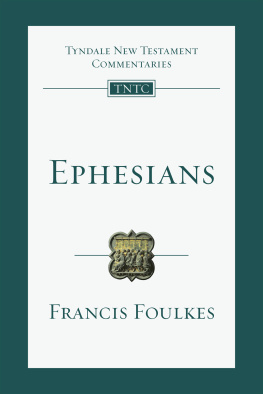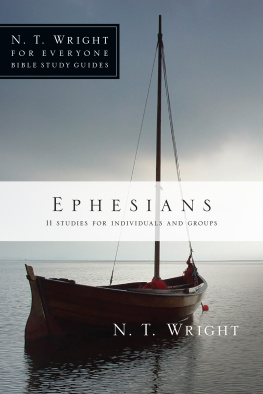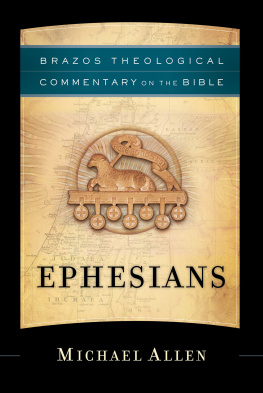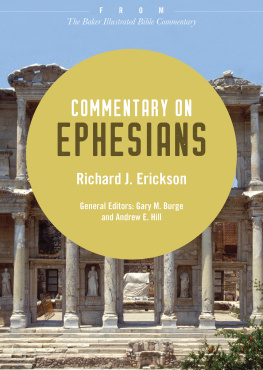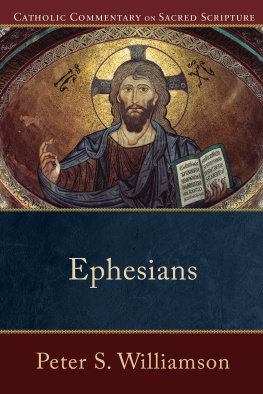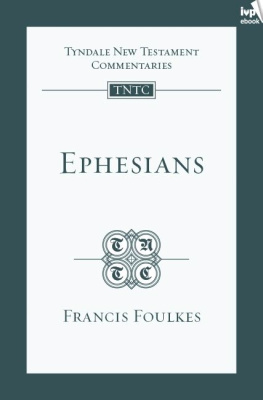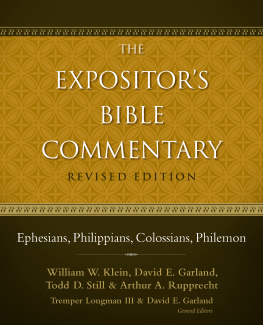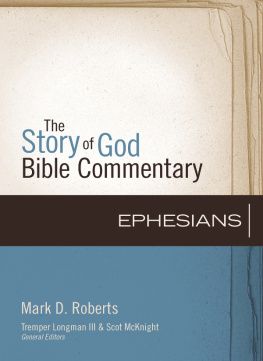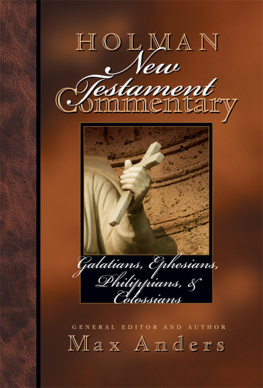TYNDALE NEW TESTAMENT
COMMENTARIES
VOLUME 10
EPHESIANS
TYNDALE NEW TESTAMENT
COMMENTARIES
VOLUME 10
GENERAL EDITOR: LEON MORRIS
EPHESIANS
AN INTRODUCTION AND COMMENTARY
FRANCIS FOULKES

InterVarsity Press, USA
P.O. Box 1400
Downers Grove, IL 60515-1426, USA
Email:
Francis Foulkes, 1989
Francis Foulkes has asserted his right under the Copyright, Designs and Patents Act, 1988, to be identified as Author of this work.
All rights reserved. No part of this publication may be reproduced, stored in a retrieval system or transmitted in any form or by any means, electronic, mechanical, photocopying, recording or otherwise, without the prior permission of InterVarsity Press.
InterVarsity Press, USA, is the book-publishing division of InterVarsity Christian Fellowship/USA and a member movement of the International Fellowship of Evangelical Students.
The Scripture quotations quoted herein are from the Revised Standard Version of the Bible, copyright 1946, 1952 1971, 1973 by the Division of Christian Education of the National Council of the Churches of Christ in the U.S.A. Used by permission. All rights reserved.
First published 1963
Second edition 1989
ISBN 978-0-8308-9488-8 (digital)
ISBN 978-0-8308-4240-7 (print)
Any internal page references refer to page numbers in the print edition.
This digital document has been produced by Nord Compo.
General preface
The original Tyndale Commentaries aimed at providing help for the general reader of the Bible. They concentrated on the meaning of the text without going into scholarly technicalities. They sought to avoid the extremes of being unduly technical or unhelpfully brief. Most who have used the books agree that there has been a fair measure of success in reaching that aim.
Times, however, change. A series that has served so well for so long is perhaps not quite as relevant as it was when it was first launched. New knowledge has come to light. The discussion of critical questions has moved on. Bible-reading habits have changed. When the original series was commenced it could be presumed that most readers used the Authorized Version and ones comments were made accordingly, but this situation no longer obtains.
The decision to revise and update the whole series was not reached lightly, but in the end it was thought that this is what is required in the present situation. There are new needs, and they will be better served by new books or by a thorough updating of the old books. The aims of the original series remain. The new commentaries are neither minuscule nor unduly long. They are exegetical rather than homiletic. They do not discuss all the critical questions, but none is written without an awareness of the problems that engage the attention of New Testament scholars. Where it is felt that formal consideration should be given to such questions, they are discussed in the Introduction and sometimes in Additional notes.
But the main thrust of these commentaries is not critical. These books are written to help the non-technical reader understand the Bible better. They do not presume a knowledge of Greek, and all Greek words discussed are transliterated; but the authors have the Greek text before them and their comments are made on the basis of what the originals say. The authors are free to choose their own modern translation, but are asked to bear in mind the variety of translations in current use.
The new series of Tyndale Commentaries goes forth, as the former series did, in the hope that God will graciously use these books to help the general reader to understand as fully and clearly as possible the meaning of the New Testament.
Leon Morris
Authors preface to the first edition
Some of the New Testament Epistles have had few outstanding commentaries written on them in English in the past hundred years. This is not so in the case of Ephesians. Our study of this Epistle is enriched by the judicious work of Armitage Robinson, Westcott and Abbott on the Greek text, the invaluable practical expositions of Findlay and Dale, and most of all by the work of Bishop Handley Moule whose work always offers the uncommon combination of careful scholarship and devotional application. To these and others (teachers and preachers as well as writers) I have been indebted constantly, and I realize that this has been the case often where I have not been sufficiently aware of the source of my indebtedness to acknowledge it.
In the Introduction there is some attempt to study briefly the problems associated with the peculiar nature of Ephesians, the Epistles relationship to other New Testament writings, its authorship and original destination. These questions, however, interesting as they are, appear to be less important for the understanding of this Epistle than is the case with almost any other New Testament letter. Therefore, I do not regard the Introduction as the most important part of the book. Doctrinal teaching is given in the Epistle without the direct application to the problems of a particular situation which we find in an Epistle such as Galatians; we have moral precepts without that reference to the peculiar problems of a church which we have in the Corinthian Epistles. Therefore, it is the study of the language and thought of the Epistle itself that will lead us most deeply into the writers understanding of the glory of God in Christ and of the high calling of those who themselves have come to live in him. Sir Edwin Hoskyns once asked, Can we study a language, and awake to the Truth? Can we bury ourselves in a lexicon, and arise in the presence of God? Many have found that they can indeed in the case of the words of this Epistle, which Coleridge called one of the divinest compositions of man.
Francis Foulkes
Authors preface to the second edition
When the first edition of this Commentary was written nearly twenty-five years ago, I commented on the wealth of outstanding writings on Ephesians. The time since then has seen the publication of further significant works in English, the major two-volume work by Markus Barth in the Anchor Bible and others in standard series, including those of F. F. Bruce (New International Commentary on the New Testament), G. B. Caird (New Clarendon Bible), J. L. Houlden (Pelican New Testament Commentary) and C. L. Mitton (New Century Bible). The work of John R. W. Stott, The Message of Ephesians (The Bible Speaks Today series) offers a fine blend of attention to exegetical detail and concern for application of the teaching of Ephesians to our contemporary situation.
There have been important studies on the background to the letter; in J. C. Kirbys Ephesians, Baptism and Pentecost there is a stress on the liturgical, in other works close comparison with the language of Qumran or the language and thought of Gnosticism. Scholarly opinion continues to be divided on the question of the authorship of the letter and, for the most part, recent works offer only a fresh arrangement of the old arguments one way and the other. A. van Roon has written a major work, The Authenticity of Ephesians, defending the Pauline authorship. On the other side, the major new work has been in the form of suggested situations in which the letter may have been composed if it were not Pauls own.

